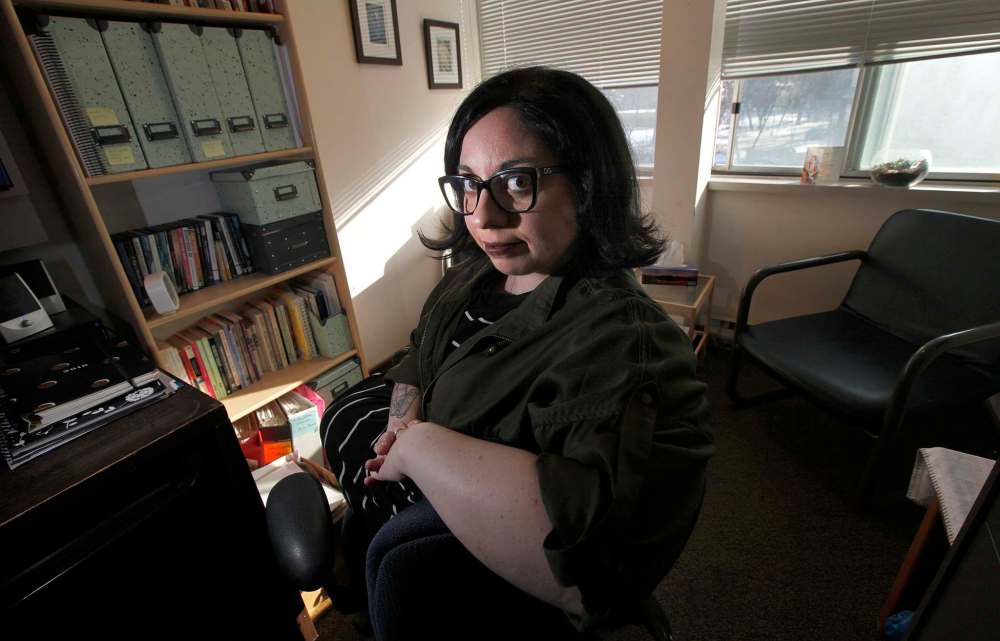Premier urges men to support women against violence
Advertisement
Read this article for free:
or
Already have an account? Log in here »
To continue reading, please subscribe:
Monthly Digital Subscription
$19 $0 for the first 4 weeks*
- Enjoy unlimited reading on winnipegfreepress.com
- Read the E-Edition, our digital replica newspaper
- Access News Break, our award-winning app
- Play interactive puzzles
*No charge for 4 weeks then billed as $19 every four weeks (new subscribers and qualified returning subscribers only). Cancel anytime.
Read unlimited articles for free today:
or
Already have an account? Log in here »
Hey there, time traveller!
This article was published 16/01/2018 (2285 days ago), so information in it may no longer be current.
Premier Brian Pallister called on men Wednesday to step up and help end violence against women.
“Being a bystander isn’t getting the job done — it means having the backs of those who feel threatened,” Pallister said.
Pallister addressed the initial men’s breakfast for Women’s Equality Week, a joint effort between government and the Winnipeg Blue Bombers, which Women’s Minister Rochelle Squires predicted would become a tradition.

When women come forward, believe them, said Squires.
“That’s the most important thing,” she said.
Pallister announced more than $147,000 funding for training, information, and education to deal with sexual violence. The money goes to community and professional organizations dealing with survivors of sexual violence.
Blue Bombers offensive lineman Matthias Goossen told the breakfast that it wasn’t until the football team’s Break the Silence campaign that he received his “first truthful and legitimate training” about sexual violence towards women.
Goossen said that previously, in university — he attended Simon Fraser University in Vancouver — a coach addressed the players: “He went through that some women on campus might make up a case of rape and ruin our season,” said Goossen.
Goossen pointed out that men who wait until they have a daughter to become committed to ending sexual violence towards women, are not getting the message.
Goossen takes his message to high school students, telling them that sexual consent must be reached before any sexual activity happens, that consent is ongoing and can be withdrawn at any time, and can’t be given by someone who is drunk or under the influence of drugs.
The Blue Bomber said that many women and girls won’t come forward, because they’re not believed: “They’re going to blame you for what you’re wearing, for being somewhere, for having a drink.”
But he challenges his high school audiences to ask themselves, would anyone raise those same issues to blame the victim of a drunk driver?
Organizations working with survivors of sexual assault welcomed the funding, but cautioned that Manitoba has significant challenges.
The training is expected to focus on what it means to compassionately respond to sexual assault, said Jerra Fraser, a counsellor with the sexual assault crisis centre at Klinic: medical professionals, school officials, friends and family and police and Crown attorneys need to know how to respond.
“I think that this is something that people want to have a better understanding of. People want to have the tools to talk about it. Because of the silence in the past, people are often quite uncomfortable receiving disclosure without training — and that’s coming from a good place, it doesn’t mean they can’t, but it’s just a reminder that you already have those really human, compassionate core capabilities,” said Fraser.
Statistics Canada says Manitoba has the highest rate of reported sexual assaults of the provinces at more than double Canada’s national rate, with Winnipeg the city with the highest rate of reported sexual assaults.
Indigenous women suffer higher rates of sexual assault than their percentage of the population.
“I think it’s important to understand the layers of trauma that… Indigenous women experience on a day-to-day basis and where that sexual violence stems from — what are the root causations for it — and having the trauma-informed lens to be able to work with survivors and encourage them to come forward to report it,” said Shauna Fontaine, program co-ordinator of the Heart Medicine Lodge.
“They need to know why this is happening, why Indigenous women are often not reporting formally and how the justice system personnel can increase their capacity of cultural safety and knowledge of trauma so that Indigenous women can come forward and report,” Fontaine said.
Training sessions in Winnipeg and Thompson are in the works. Within the justice system, they’ll be in addition to annual workshops that are already provided for Crown attorneys who prosecute sexual assault cases and national working groups that senior justice officials attend on the subject, said the province.
Nicole Chammartin, executive director of Klinic, said a training session for the prosecution service is set to happen next week. “Our goal is to ensure that the voice of the people who have had these experiences is helping to shape how they’re dealt with within the justice system,” she said.
nick.martin@freepress.mb.ca
katie.may@freepress.mb.ca

Katie May
Reporter
Katie May is a general-assignment reporter for the Free Press.
History
Updated on Thursday, January 18, 2018 2:47 PM CST: minor formatting changes, corrects spelling of Klinic
Updated on Thursday, January 18, 2018 7:27 PM CST: fixes typo



